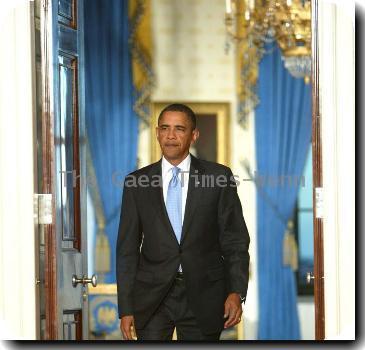White House: Obama will recognize Day of Prayer after judge’s ruling day is unconstitutional
By Todd Richmond, APThursday, April 15, 2010
White House: Obama will issue prayer proclamation
MADISON, Wis. — White House officials say President Barack Obama still will recognize a National Day of Prayer after a federal judge’s ruling the day is unconstitutional.
U.S. District Judge Barbara Crabb in Madison, Wis., ruled Thursday that the day violates separation of church and state. The ruling comes in a lawsuit filed against the federal government by the Freedom From Religion Foundation.
But Crabb says her order doesn’t block a prayer day until after all appeals are exhausted.
Obama spokesman Matt Lehrich says in an e-mail to The Associated Press that the ruling therefore doesn’t prevent the president from issuing a proclamation for the day recognized in May.
A spokesman for the U.S. Justice Department, which represented the government in the case, declined to comment on the ruling.
THIS IS A BREAKING NEWS UPDATE. Check back soon for further information. AP’s earlier story is below.
MADISON, Wis. (AP) — A federal judge in Wisconsin ruled the National Day of Prayer unconstitutional Thursday, saying the government cannot call for religious action.
Congress established the day in 1952 and in 1988 set the first Thursday in May as the day for presidents to issue proclamations asking Americans to pray. The Freedom From Religion Foundation, a Madison-based group of atheists and agnostics, filed a lawsuit against the federal government in 2008 arguing the day violated the separation of church and state.
President Barack Obama’s administration has countered that the statute simply acknowledges the role of religion in the United States. Obama issued a proclamation last year but did not hold public events with religious leaders as former President George W. Bush had done.
Government involvement in prayer is constitutional only as long as it does not call for religious action, which the prayer day does, U.S. District Judge Barbara Crabb wrote in her ruling.
“It goes beyond mere ‘acknowledgment’ of religion because its sole purpose is to encourage all citizens to engage in prayer, an inherently religious exercise that serves no secular function in this context,” Crabb wrote. “In this instance, the government has taken sides on a matter that must be left to individual conscience.”
Messages seeking comment were left with the White House and the U.S. Department of Justice, which represented the government in the case.
The American Center for Law and Justice, which represented 31 members of Congress who joined the federal government as defendants, called Crabb’s ruling flawed and promised to appeal.
“It is unfortunate that this court failed to understand that a day set aside for prayer for the country represents a time-honored tradition that embraces the First Amendment, not violates it,” ACLJ Chief Counsel Jay Sekulow said in a statement.
A message seeking comment was left with an attorney for the Freedom From Religion Foundation.
Tags: Barack Obama, District Of Columbia, Madison, North America, Prayer, Religious Issues, United States, Wisconsin

